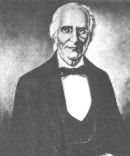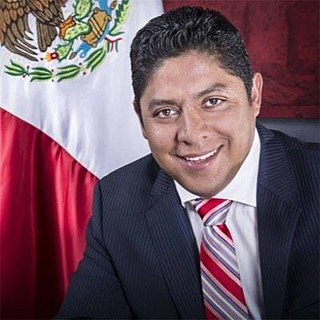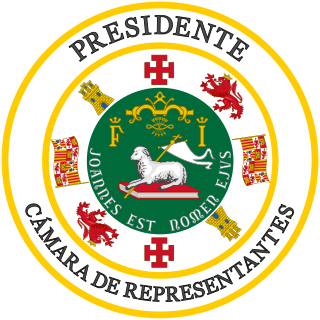
The Nationalist Party of Puerto Rico is a Puerto Rican political party founded on September 17, 1922, in San Juan, Puerto Rico. Its primary goal is to work for Puerto Rico's independence. The Party's selection in 1930 of Pedro Albizu Campos as its president brought a radical change to the organization and its tactics.

The Mexican state of Nuevo León has been governed by more than a hundred individuals in its history, who have had various titles and degrees of responsibility depending on the prevailing political regime of the time.

The House of Representatives of Puerto Rico is the lower house of the Legislative Assembly of Puerto Rico, the bicameral territorial legislature of Puerto Rico. The House, together with the Senate, control the legislative branch of the government of Puerto Rico.

The governor of Querétaro is the chief executive of the Mexican state of Querétaro. According to the Constitution of the Free and Sovereign State of Queretaro, the exercise of executive power of the Mexican state, is deposited in one individual, it called the Constitutional Governor is elected for a period of six years no re-eligible for any reason. The governmental period begins on October 1 of the year of the election and ends on September 30 after six years have elapsed. Queretaro state was created in 1824, one of the original states of the federation, thus throughout its historical life has passed by all systems of governance found in Mexico, both federal system as the central system, so the name of the organization has varied between been and department; changing along with it, the name of the head of the Executive branch of government.

The governor of Chiapas is the chief executive of the Mexican state of Chiapas. The state constitution stipulates a term of 6 years, to which governors can only be elected once. It also specifies the qualifications for becoming governor: a Mexican citizen by birth, aged at least 30 years old, and having not less than 5 years residency in Chiapas. The current governor is Rutilio Escandón from the MRN, who assumed the position in 2018.

The LVI Legislature of the Congress of Mexico met from 1994 to 1997.

According to the Political Constitution of the Free and Sovereign State of Colima, the exercise of the Executive Power of this Mexican entity is placed in a single individual, called the Constitutional Governor of the Free and Sovereign State of Colima who is chosen for a period of 6 years and is not eligible for reelection. The term of governor begins November 1 of the year of the election and finishes October 31 after six years have elapsed.

Ulises Francisco Espaillat Quiñones was a 19th-century Dominican Republic liberal politician and author. He served as president of the Dominican Republic from April 29, 1876, to October 5, 1876. Espaillat Province is named after him.

The Government Development Bank for Puerto Rico (GDB) —Spanish: Banco Gubernamental de Fomento para Puerto Rico (BGF)— is the government bond issuer, intragovernmental bank, fiscal agent, and financial advisor of the government of Puerto Rico. The bank, along with its subsidiaries and affiliates, serves as the principal entity through which Puerto Rico channels its issuance of bonds. As an overview, the different executive agencies of the government of Puerto Rico and its government-owned corporations either issue bonds with the bank as a proxy, or owe debt to the bank itself.

The governor of San Luis Potosí exercises the role of the executive branch of government in the Mexican state of San Luis Potosí, per the Political Constitution of the Free and Sovereign State of San Luis Potosí. The official title is Gobernador Constitucional del Estado Libre y Soberano de San Luis Potosí.

The President of the House of Representatives of Puerto Rico —commonly called the Speaker of the House — is the highest-ranking officer and the presiding officer of the House of Representatives of Puerto Rico. The Speaker has voting powers as it is elected amongst the own members of the House as established by Article III of the Constitution of Puerto Rico. The Constitution, however, does not establish its functions and since the House is the only body authorized by the Constitution to regulate its own internal affairs, the functions of the Speaker vary from session to session—save being called "Speaker" as the Constitution establishes. The Speaker is typically elected during the House inaugural session.
The Secretary of Justice of Puerto Rico is the chief legal officer and the attorney general of the government of Puerto Rico.
The secretary of treasury of Puerto Rico is the chief financial officer and the treasurer of the government of Puerto Rico.

The Ministry of Public Finance is a government ministry of Guatemala in charge of fiscal policy and public finances.

The 2024 Puerto Rico gubernatorial election will be held on November 5, 2024, to elect the governor of Puerto Rico, concurrently with the election of the Resident Commissioner, the Senate, the House of Representatives, and the mayors of the 78 municipalities. Incumbent New Progressive Party Governor Pedro Pierluisi Urrutia is running for re-election to a second term in office.













